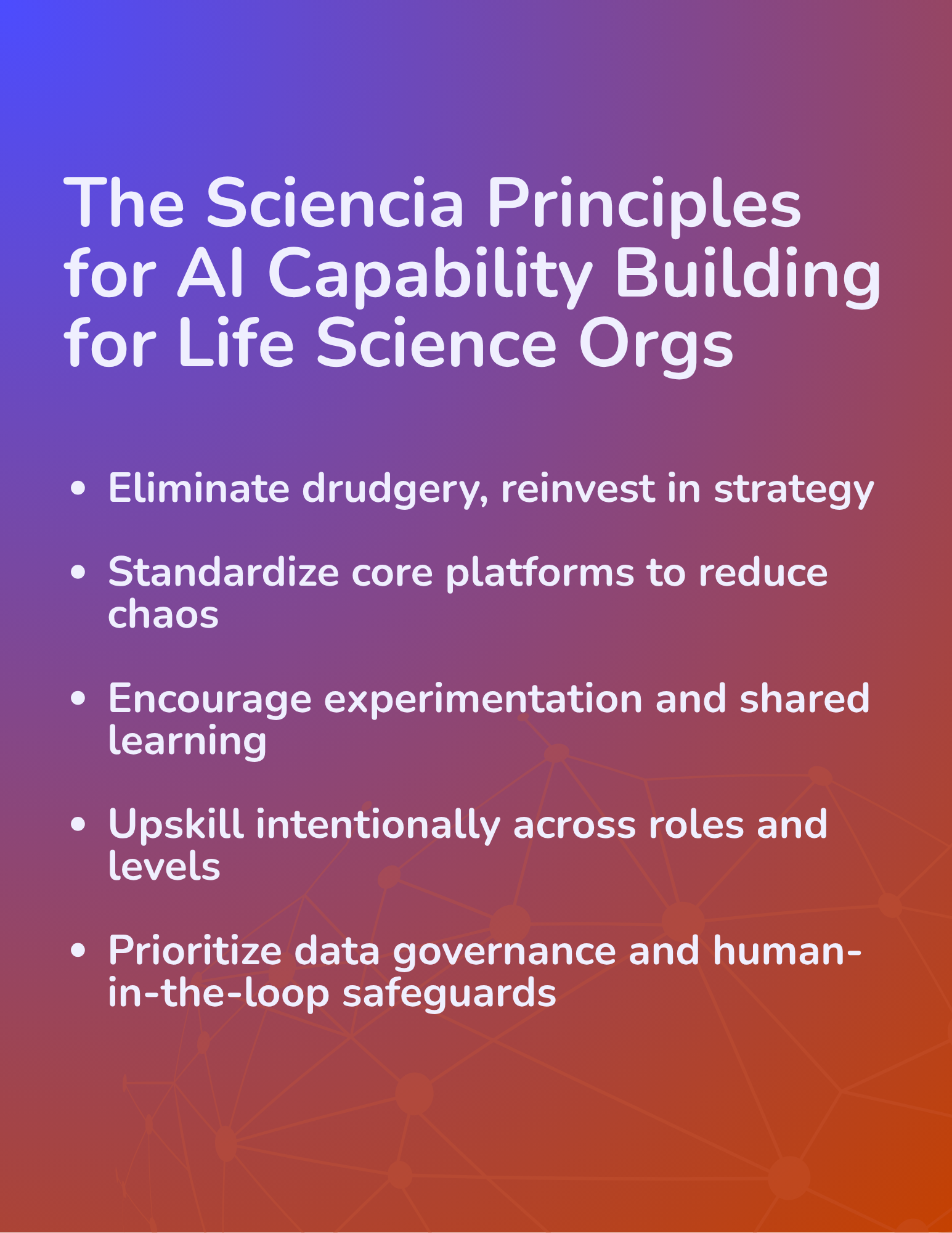The highest-performing life science digital marketing teams don’t succeed because of a single asset, they stand out because of the way they operate and consistently show up.
While the full potential of AI in marketing within life sciences research and discovery is still unfolding, there will come a point when scientific innovation outpaces how it’s communicated within organizations, to the scientific community, and to the public. And when that happens, critical opportunities will be missed. As a life science industry, we need to get ahead of that curve.
Here’s some of the new types of roles we see in other industries that are more consumer based and could provide us a glimpse into the future.
New Roles in Life Science Digital Marketing
Behind the scenes, entirely new roles are emerging in the age of AI in digital marketing. They may sit within marketing, but they touch product, science, and strategy. These roles include:
AI Process Engineer
Part consultant, part operator, this role evaluates workflows, identifies where AI can deliver efficiencies, and designs compliant automation that actually sticks.
Life Science Content Architect
The blueprint builder, designing scalable, compliant content frameworks that work across channels, teams, and tools.
Short form content creator
Crafts high-context, concise blogs or videos that fuel AI search visibility, delivering quick wins through a consistent, ongoing publishing rhythm.
GenAI Content Auditor
Quality control for the AI era, ensuring outputs don’t just sound right but are accurate, credible, and compliant.
UX + Design Experience Strategist
Bridging science and attention, translating complexity into digital experiences that are intuitive, engaging, and trustworthy.
Director of AI Enablement
A visionary leader who unites strategy, performance, experimentation, and influence to scale AI-powered marketing with speed and credibility.
What These Changes Mean for Life Science Digital Marketers Today
None of this means you need to completely transform your identity overnight, or ever for that matter. But it does demand a daily commitment to learn, test, and improve your AI skillset.
Experiment with AI in your workflows
Learn more about other fields like UX and behavioral psychology, and graphic design
Learn more about AI integration in life science digital marketing workflows by signing up for our blog updates that include our latest reports from Sciencia’s GenAI Testing Lab
It also helps to have a few guiding AI principles. Here are Sciencia’s.
Success is no longer just strategy and execution. It’s orchestration.
The Future of Life Science Digital Marketing Teams
The future belongs to life science digital marketing teams who can think across disciplines, prompt AI with precision, and architect ecosystems that move with both speed and integrity.
Modern life science marketers are:
Translating cross-functional data into searchable stories
Guiding generative AI to produce modular, compliant assets
Designing omnichannel experiences that feel both scientific and personal
Using behavioral signals, not just demographics, to drive relevance
This isn’t about a new tech stack. It’s about a new kind of marketer—one who understands how AI in marketing transforms traditional approaches and develops three essential upskills:
Cross-Functional Instinct
They move between PR, SEO, websites, social, medical, legal, and marketing like fluent translators, ensuring science speaks business and business speaks science.
Prompt Engineering Meets Strategic Thinking
They don’t just “feed” AI, they guide it, work with it, challenge it, and humanize its outputs so the results are insightful, not generic2. The most successful practitioners of AI in marketing know that strategic thinking must drive the technology, not the other way around.
Performance Digital Mindset
They see past vanity metrics. They know which signals matter, when to act, and how to connect digital performance back to business outcomes.
References
Generative AI in life sciences marketing: The year of experimentation, ZS, March 2025.
Effect of Confidence and Explanation on Accuracy and Trust Calibration in AI-Assisted Decision Making, arxiv, Jan 2020.
FAQ
AI marketing tools revolutionize how marketing professionals handle repetitive tasks in life sciences. These cutting edge AI tools excel at automating routine tasks like data entry, content creation, and social media management. Machine learning algorithms can analyze vast amounts of customer data and consumer data to generate actionable insights, while natural language processing enhances customer service interactions. Marketing departments leveraging AI technology see significant improvements in marketing automation, allowing teams to focus on strategic marketing initiatives rather than manual processes.
Predictive analytics powered by AI algorithms transforms how life science companies understand customer behavior and consumer behavior. By analyzing historical data and real time data, AI systems provide key insights into customer preferences and customer engagement patterns. This data driven decision making approach enables marketing leaders to create more effective marketing campaigns and marketing strategies. AI driven marketing efforts use sentiment analysis and data analysis to enhance customer insights and deliver competitive advantage through precise audience segmentation.
AI generated content and content marketing tools are transforming how life science companies create social media posts and marketing materials. Artificial intelligence can create content that's both scientifically accurate and engaging, while marketing ai institute research shows these tools significantly reduce time spent on content creation. AI capabilities include generating blog posts, social media management content, and technical documentation. However, the most successful marketing programs combine AI development with human oversight to ensure compliance and scientific accuracy.
Marketing professionals need to develop specific AI skills to stay competitive in the evolving landscape. Essential in demand skills include understanding machine learning applications, prompt engineering, and data analytics. Business leaders should focus on incorporating AI into existing workflows while building expertise in AI adoption strategies. Key competencies include working with AI marketing tools, interpreting customer insights from software platforms, and using virtual assistants for search engine optimization. The most valuable professionals understand how to leverage AI while maintaining strategic thinking capabilities.
AI systems significantly improve customer experience by enabling personalized interactions across multiple touchpoints. Machine learning algorithms analyze customer interactions and customer feedback to enhance customer engagement through tailored experiences. AI technology powers programmatic advertising that reaches the right audiences, while AI capabilities enable e-commerce sites to provide personalized recommendations. Future trends indicate that AI powered tools will become even more sophisticated at understanding customer behavior and delivering relevant content at optimal times.
Successful AI adoption in life science marketing efforts requires strategic planning and proper implementation. Marketing leaders should start by identifying specific use cases where AI tools can deliver immediate value, such as automating repetitive tasks or improving data analysis capabilities. The most effective approaches combine artificial intelligence with human expertise, ensuring that AI impact marketing initiatives maintain scientific rigor and regulatory compliance. Business leaders should invest in training teams to analyze consumer data, generate insights from customer data, and integrate AI technology with existing marketing departments' workflows for optimal results.





